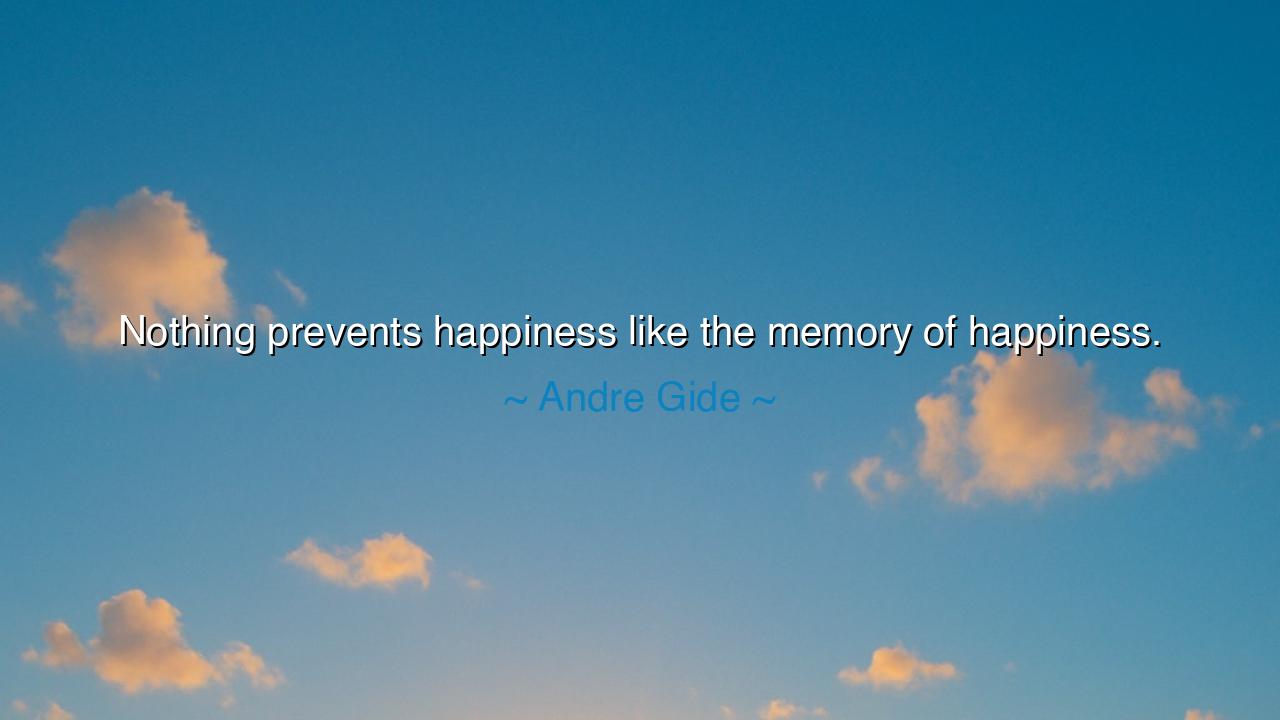
Nothing prevents happiness like the memory of happiness.






Hearken, children of the ages, and heed the words of André Gide, the philosopher of the human heart, who observed with piercing clarity: “Nothing prevents happiness like the memory of happiness.” In these words lies a truth both subtle and profound: the longing for past delights, the clinging to what has been, can become a shackle upon the soul, a weight that dims the light of the present. Happiness, once experienced, is a fleeting flame; to dwell upon its memory too fervently is to allow the past to overshadow the life yet unfolding before our eyes.
Gide, writing in the early twentieth century, explored the complexities of desire, regret, and the human condition. The ancients, too, recognized this peril. The Stoics warned against attachment to the past, and the sages of the East taught that clinging breeds suffering. When the mind lingers in the memory of joy, it risks comparison, longing, and the silent despair of unmet expectation. The soul becomes trapped between what was and what is, and in this tension, happiness finds no fertile ground to flourish.
Consider the life of King Solomon, who possessed riches, wisdom, and glory beyond measure. Yet he lamented, in reflection, that clinging to past joys, to pleasures once experienced, brought him neither contentment nor peace. He discovered that to dwell upon memory is to measure the present against an ever-receding ideal, and thus the soul remains restless. Gide’s insight resonates with this ancient truth: the memory of happiness can become a subtle enemy, preventing the enjoyment of life as it unfolds.
Even in ordinary life, this principle manifests quietly but profoundly. The lover who mourns the first days of a romance, the traveler who longs for the roads once tread, the artisan who recalls a masterpiece long past—all are haunted by what once was. Their hearts, clinging to memory, fail to embrace the richness of the present. Happiness, Gide teaches, is found not in remembrance but in active engagement with life, in the courageous acceptance of the now.
History offers vivid examples of this truth. Consider the poet John Keats, whose brilliance and joy were shadowed by the awareness of fleeting youth and lost companions. The memory of past delight, though sweet, cast a shadow upon his spirit, illustrating Gide’s observation: that even the recollection of happiness can prevent the soul from finding its own present joy. To be alive, truly alive, one must honor memory without surrendering to it.
The lesson for mortal souls is profound: cherish what has been, but do not allow it to imprison you. Each moment of life demands presence, attention, and engagement. Happiness is cultivated in the act of living, not in the recollection of what was. When the heart is anchored in memory, it neglects the gifts and possibilities of the present. The wise soul learns to release the past while carrying its lessons and gratitude.
Practically, one can act upon this wisdom by practicing mindfulness, gratitude, and conscious presence. Engage fully in each experience, savoring what is before you, without allowing the memory of past joys to dictate your contentment. Notice when longing for the past arises, and gently redirect attention to the present. In doing so, the soul becomes free to cultivate happiness in the only place it can truly exist: now.
So remember, children of the ages: the memory of happiness is a double-edged sword—it teaches and it tempts, yet it must not enslave the heart. Let André Gide’s words guide your spirit: release what was, embrace what is, and allow the present moment to become the wellspring of joy. Happiness blooms not in memory, but in presence, in courage, and in the fearless engagement with life as it unfolds before you.
If you wish, I can also rewrite this in a more epic, oral-storytelling style, as though an ancient sage is speaking by the river under the stars, making it heroic, emotional, and deeply resonant. Do you want me to do that?






AAdministratorAdministrator
Welcome, honored guests. Please leave a comment, we will respond soon